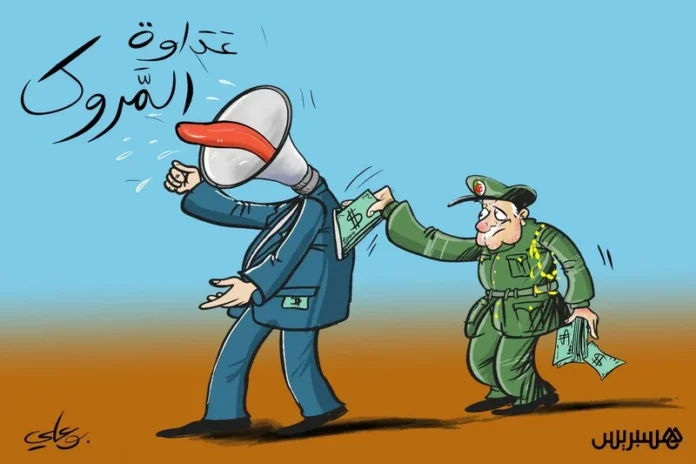An analytical reading of the media attacks on Morocco and the broader geopolitical context of regional influence struggles
As geopolitical shifts accelerate, disinformation campaigns targeting the Kingdom of Morocco are intensifying—revealing the last cards of fragile regimes that have lost direction in a ruthless regional landscape. The latest episode involves the widespread circulation of a forged document allegedly from Moroccan authorities claiming “the death of Moroccan officers in Israel.” Despite its crude content and flawed formatting, the goal is not credibility but rather generating media noise to stir Arab and Muslim public opinion against Morocco at a critical moment.
🚨 الصواريخ الإيرانية لم ترحم حلفاء إسرائيل المغاربة
🔹 وفقًا لوثيقة مسرّبة، قُتل اثنان من كبار الضباط في الجيش المغربي أثناء مشاركتهما في تدريبات مشتركة مع الجيش الإسرائيلي، وذلك خلال الهجمات الصاروخية الإيرانية على الأراضي المحتلة.
— إيران بالعربية (@iraninarabic_ir) June 22, 2025
But can this low-level propaganda be understood without examining the broader context? Why are Algeria and Iran, through their media arms, resorting to falsification and deception rather than open political confrontation? Is this shift in tone a sign of power—or evidence of deep disorientation and geopolitical losses?
Propaganda as the Tool of the Cornered: Attempting to Demonize Morocco
Shadi Abdessalam Baraq, an international expert in conflict analysis and crisis management, describes these campaigns as a form of “media hysteria” targeting Morocco’s strategic institutions, particularly the military. He places them in the context of repeated failures to break Morocco’s internal unity, which remains firmly aligned behind the monarchy.
Baraq argues that adversaries turning to so-called “fourth generation warfare”—built on rumors, lies, strategic deception, and psychological warfare—is a clear sign of weakness. These desperate efforts aim to disrupt Morocco’s progress, especially regarding the Sahara issue, where global support for the autonomy initiative is growing steadily as the only viable and realistic solution.
The ludicrous claim of a Moroccan military presence in Israel is a blatant attempt to frame Morocco within a narrative of a “common enemy,” leveraging religious and nationalist sentiment to attack the Moroccan Armed Forces under the leadership of King Mohammed VI, known for his balanced positions and support for just causes.
Algeria – Iran: A Nervous Alliance Looking for Leverage
Algerian political activist Chawki Ben Zahra sees Algerian state media as now fully integrated into an organized misinformation machine. He claims the aim is to distract from the murky Algeria-Iran relationship, which raises concerns both domestically and abroad. Ben Zahra adds that fabricating such “scandals” is a desperate attempt to mask Algeria’s chronic diplomatic failures and inability to form genuine alliances based on mutual interests rather than empty posturing.
Image and Credibility Warfare: Morocco’s Response
Morocco, for now, has opted for a calm strategic response—strengthening meaningful alliances, consolidating international credibility, and avoiding escalation. This choice reflects not only a strong position but also a maturity in managing the broader battle: the battle of image and legitimacy.
In this context, several essential questions arise:
- What drives an entire regime to fabricate documents to smear a neighboring country?
- Where is the Algerian-Iranian relationship headed, and does it pose a true threat to regional balance?
- How can Morocco counter soft warfare without falling into the trap of media mudslinging?
Between Lies and Moroccan Strategic Gains
These questions must be analyzed in a wider international context. Today, Morocco is seen as a strategic partner across many fields—security, economics, diplomacy. The Kingdom has built rare global trust, in stark contrast to the increasing diplomatic isolation of its adversaries.
In this light, propaganda and document falsification are the only tools left. But what adversaries fail to understand is that the battle for public awareness is no longer won through hastily spread lies, but rather through national unity, external credibility, and alliances based on shared, tangible interests.
Final Thoughts
What we are witnessing is not just a media campaign against Morocco—but the expression of what some experts call a “narrative crisis” in the opposing camp. Old stories no longer resonate, traditional alliances are collapsing, and manipulation has become the last refuge.
Meanwhile, Morocco appears to be advancing steadily, asserting itself as a stabilizing force in a turbulent region—without stooping to its opponents’ language or tactics.
Is it time to redefine the rules of regional influence?




